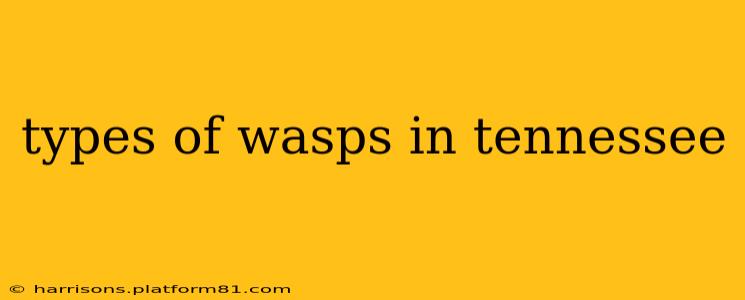Types of Wasps in Tennessee: A Comprehensive Guide
Tennessee, with its diverse ecosystems ranging from mountains to plains, is home to a wide variety of wasp species. Understanding the different types is crucial for safety and effective pest management. This guide explores common Tennessee wasps, their characteristics, and how to differentiate them.
Understanding Wasp Diversity in Tennessee
Before diving into specific species, it's important to note the sheer diversity. Wasps are a broad group of insects, and many different families and species call Tennessee home. This guide focuses on some of the most commonly encountered and significant types. Remember, proper identification is key to understanding their behavior and potential threat. If you're unsure about a wasp species, it's always best to err on the side of caution and maintain a safe distance.
Common Types of Wasps Found in Tennessee
1. Yellow Jackets (Vespula spp.)
Yellow jackets are perhaps the most infamous wasps in Tennessee. Their aggressive nature and painful stings make them a frequent nuisance. They are social insects, living in large colonies often located underground or in wall voids. They are characterized by their bright yellow and black stripes.
- Identifying Features: Bold yellow and black banding, relatively stout body.
- Behavior: Highly aggressive, especially when protecting their nests.
- Habitat: Underground nests, wall voids, attics.
2. Paper Wasps (Polistes spp.)
Paper wasps are easily identified by their slender bodies and long legs. Unlike yellow jackets, they are generally less aggressive, stinging only when provoked. They build open, papery nests, often under eaves or on porch ceilings.
- Identifying Features: Slender body, long legs, papery nests.
- Behavior: Less aggressive than yellow jackets, will sting if threatened.
- Habitat: Open, exposed nests under eaves, porch ceilings, tree branches.
3. Bald-Faced Hornets (Dolichovespula maculata)
Despite their name, bald-faced hornets are actually a type of yellow jacket. They're larger than most yellow jackets and are black with white markings. They build large, enclosed nests often high in trees or on structures.
- Identifying Features: Large size, black body with white markings, enclosed paper nests.
- Behavior: Aggressive when protecting their nest.
- Habitat: High in trees, on structures, sometimes in shrubs.
4. Cicada Killers (Sphecius speciosus)
Cicada killers are large, solitary wasps that prey on cicadas. While they have a formidable appearance, they are generally not aggressive unless handled. Males are known for their territorial displays, but they cannot sting.
- Identifying Features: Large size, black and yellow/orange markings.
- Behavior: Solitary, generally docile unless handled.
- Habitat: Sandy areas where they dig burrows.
5. Mud Daubers (Sceliphron spp.)
Mud daubers are solitary wasps that build nests out of mud. They are slender and often have a distinctive metallic sheen. They are not aggressive and rarely sting.
- Identifying Features: Slender body, metallic sheen, mud nests.
- Behavior: Solitary, non-aggressive.
- Habitat: Various locations where they can build mud nests, often in sheltered areas.
What to Do if You Encounter Wasps in Tennessee?
If you encounter a wasp nest, it’s best to avoid it. Do not attempt to remove it yourself unless you are trained in proper wasp removal techniques. Contact a pest control professional for safe and effective removal. If you are stung, seek medical attention if you experience an allergic reaction or severe symptoms.
Frequently Asked Questions
Are all wasps in Tennessee dangerous?
No, not all wasps in Tennessee are dangerous. While some, like yellow jackets, are known for their aggressive nature, many species are docile and pose little threat to humans.
How can I identify a wasp nest?
Wasp nests vary greatly in appearance depending on the species. Some are open, papery structures, while others are enclosed and made of mud or other materials. Their location can also be a clue; yellow jackets often nest underground, while paper wasps prefer open, sheltered locations.
What is the best way to prevent wasps from building nests on my property?
Regularly cleaning up debris and sealing cracks and crevices can help deter wasps from building nests. Keeping food and drinks covered outdoors can also reduce their attraction to your property.
This guide provides a general overview of some common Tennessee wasps. For definitive identification, consulting with a local entomologist or using specialized field guides is recommended. Remember, responsible interaction with wildlife is crucial for both your safety and the well-being of these fascinating creatures.
